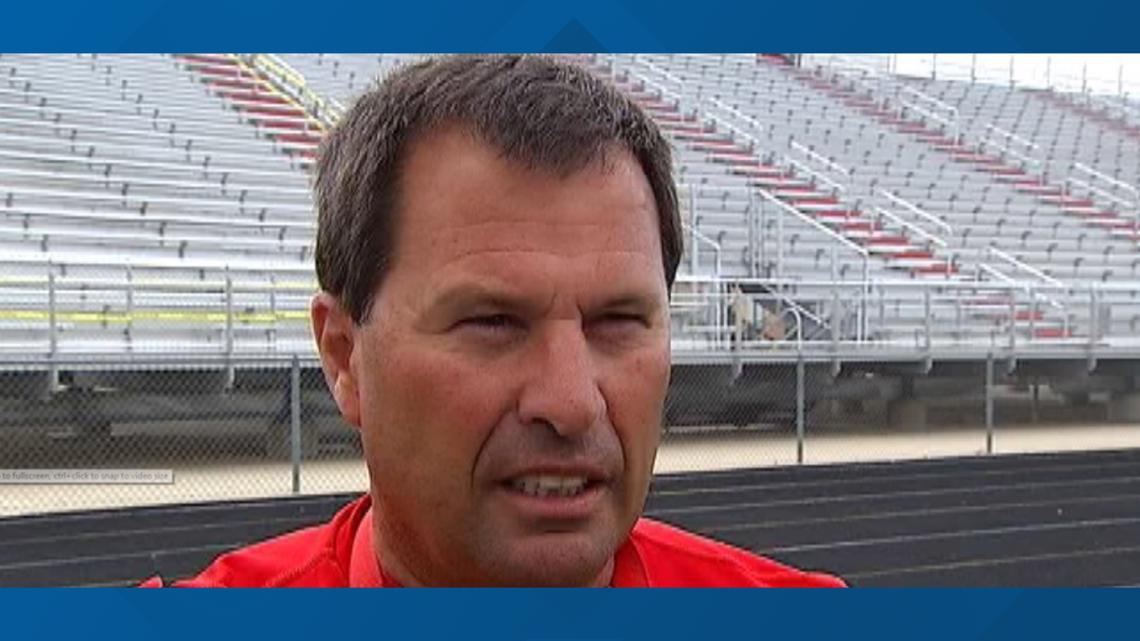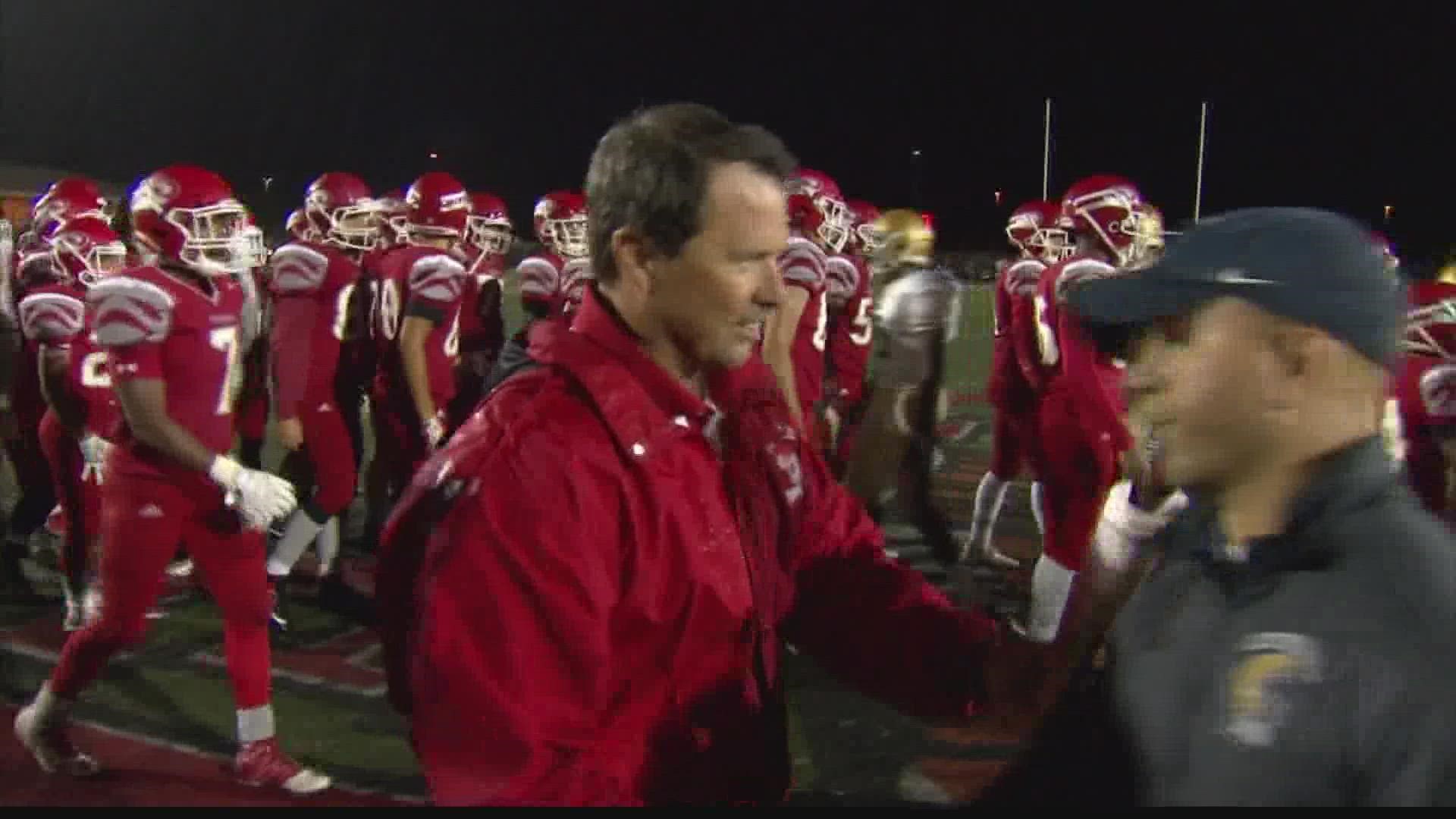INDIANAPOLIS — Indiana’s Supreme Court says the Hamilton Southeastern school district did not provide adequate facts to explain why its school board quietly suspended a former football coach.
The ruling from the state’s highest court, which comes as the latest chapter in a five-year legal battle between WTHR and HSE over public records, is considered a significant win for transparency and Hoosiers’ ability to access public information when public employees are disciplined.
“This isn’t just a win for WTHR. This is a win for everyone who lives in the state of Indiana,” said Adam Marshall, an attorney at the Reporters Committee for Freedom of the Press who has represented 13News throughout the lawsuit. “It’s such an important issue across all manner of governmental entities, and the Supreme Court affirmed that the public has a right to know. We have a right to know the facts when something goes wrong within government”
While the Supreme Court’s unanimous decision in WTHR-TV v. Hamilton Southeastern School District involves the suspension of former Fishers High School head football coach Rick Wimmer, the court’s decision impacts thousands of public employees across Indiana, and legal experts say it establishes new precedent to cement the public’s right to know why those employees are suspended, demoted or fired.
Football coach investigated
More than five years ago, in fall of 2016, the Hamilton Southeastern School Board and Fishers Police were conducting an investigation involving Rick Wimmer, who was then in his 11th season as a teacher and head football coach at Fishers High School.


The investigation focused on an altercation that had just taken place between Wimmer and a student, and according to a police report, the incident began when the student arrived late for class.
“The teacher instructed the student to proceed to the back of the class, at which time the student verbally disagreed and refused to move. In attempt to direct the student to the back of the room, the teacher placed his hands on the student’s shoulder and upper chest. The student immediately reacted and the teacher removed his hands,” the report said.
The student’s mother later confirmed for 13News that her son was one minute late for his physical education class when Wimmer allegedly rushed at her son in an aggressive manner and pushed him backwards.
"My son was 16 years old and the coach is a grown man. You should have enough life skills, you should have enough patience and enough professionalism to be able to prevent yourself from charging a child, and that's exactly what he did," said Joniece Brooks, who also told 13News that Wimmer informed her son that he was being dropped from the football team.
Wimmer was placed on paid administrative leave and not permitted to coach a football game during the investigation. Police determined no additional action was required, the school district completed its investigation and Wimmer quickly returned to his roles in the classroom and on the sideline.
It appeared the situation was resolved. But new action taken by the Hamilton Southeastern School Board several months later would raise more questions about the coach and trigger a lengthy legal battle.
Secret suspension exposed
Three months after the Wimmer investigation, Hamilton Southeastern Schools quietly voted to suspend employee #10042. The move, announced only in a consent agenda approved by the school board, was highly unusual.
The consent agenda listed 38 employees by name, along with their specific position and the action being voted on by board members. But employee #10042 was not identified by name – only by number – and was listed only as a “teacher.” That teacher was suspended without pay for five days.
After several inquiries by 13News, the school district identified employee #10042 as Rick Wimmer. But Hamilton Southeastern Schools would not tell WTHR whether the suspension was related to the previous altercation that had been investigated by the school board and Fishers Police or for a separate incident that had never been made public. School officials, based on advice from their outside attorneys, decided to keep details about the suspension secret – even though Indiana’s Access to Public Records Act requires public schools to release that information.
So 13News filed two separate complaints with Indiana’s Public Access Counselor.
Both times, PAC Luke Britt confirmed the school district is obligated to provide more facts. And both times, the school district refused, continuing to hide details surrounding the coach's suspension.
“They violated the spirit and intent of the law,” Britt announced in 2017 after releasing one of his opinions. “When something like this happens, the public has the right to know what happened.”
Britt’s comments are based upon the requirement in state law that public agencies (including schools) must release a “factual basis for disciplinary action" whenever an employee is suspended, demoted or fired.
HSE has not released a factual basis. The school district has told 13News only that it suspended the coach for “not implementing instructions for classroom management strategies” and for violating school board policy G02.06.
That policy is written in vague language such that an employee of Hamilton Southeastern Schools could be suspended for dozens of different reasons, such as failing to “demonstrate behaviors which contribute toward an appropriate school atmosphere.”
Case focuses on just two words
WTHR argued the school’s explanation gives no “factual basis” for the suspension, which violates Indiana’s public records law. The state’s Public Access Counselor, who is charged with interpreting the law and intervening in compliance disputes, agrees with 13News’ position.
“It’s that modifier – factual – that’s important. That implies the General Assembly intended more than just a passing reference to a policy. It requires an actual detail or tangible fact to let the reader of that factual basis know with some level of confidence what happened and why that employee was faced with suspension, demotion or discharged,” Britt told 13News. “I think the law is pretty clear.”
The Hamilton Southeastern School District disagreed. Its attorneys, who have collected thousands of dollars in legal fees while advising the HSE school board to withhold more information about Wimmer’s unpaid suspension, argued Indiana law does not clearly define factual basis and, therefore, the vague information it previously released is enough.
The school district has maintained that position even after the coach texted WTHR in October 2018 – two years after 13News first asked the coach to give more details of the suspension – to say his unpaid suspension approved by the school board in December 2016 was related to the same classroom situation that the board and police had already investigated.
"The 1-week suspension was for this same incident ... I was initially given a paid leave which converted to unpaid leave after investigation was complete ... It was the same incident," Wimmer wrote. (He has since left Fishers High School and now serves on the football coaching staff at the University of Indianapolis.)
When asked to confirm if Wimmer’s statement was accurate, HSE superintendent Allen Bourff and attorneys for the school district declined to comment to 13News. To date, HSE has not released even the date of the event(s) that led to the former Fishers football coach’s unpaid suspension.
Because Hamilton Southeastern Schools refused to disclose specific facts about the suspension and because decisions by the Indiana Public Access Counselor are only advisory and cannot be enforced without seeking legal action, 13News exercised its right to seek a remedy though Indiana courts.
With legal support from Reporters Committee for Freedom of the Press, a not-for-profit organization that provides legal resources to protect First Amendment freedoms and the newsgathering rights of journalists, WTHR filed a lawsuit against HSE to protect the public’s right to information. The lawsuit, filed in Hamilton County Superior Court, asked the court to require HSE to provide a “factual basis” that includes, well, actual facts.
Both a trial judge and the Indiana Court of Appeals sided with the school district’s position that Indiana law does not mandate a more detailed explanation to provide a sufficient factual basis. Thursday morning, the Indiana Supreme Court disagreed with those lower court rulings, releasing a decision that requires public agencies to include facts as part of their factual basis for employee discipline.
Supreme Court leaves little doubt
In its 10-page ruling, the Supreme Court rejected HSE’s argument that the school district had publicly released enough information to be considered a sufficient factual basis.
“HSE’s most comprehensive ‘factual basis’ … provides no facts about Wimmer’s actions that led to his suspension. It only concludes that he violated a broad policy. It does not even say when he violated that policy. A reasonable person would not know what Wimmer did to merit discipline, only that HSE decided to discipline him because it decided he violated a policy,” Justice Mark Massa wrote on behalf of the court. “It did not contain facts about Wimmer’s actions that would allow a reasonable person to understand why he was suspended. HSE’s ‘factual basis’ was insufficient.”
The justices went a step further, providing additional guidance about what constitutes an adequate factual basis – even going so far as to cite the meaning of factual basis in criminal law when trial courts enter judgment upon a guilty plea based on a “factual basis” for the plea.
“Certainly, a criminal conviction differs from employment discipline in many important ways. But both involve wrongdoing and punishment. And the ‘factual basis’ requirement for guilty pleas and the cases interpreting it preceded the requirement in the personnel file exception, which was enacted in 2003,” Massa wrote while also referring a prior Court of Appeals case that found “When ... judicial interpretations have settled the meaning of an existing statutory provision, repetition of the same language in a new statute indicates, as a general matter, the intent to incorporate its ... judicial interpretations as well.”
The justices also determined when a public agency provides a factual basis for employee discipline, “it must provide some facts about the employee’s actions,” and “[t]hose facts must be sufficient for a reasonable person to understand what an employee did to deserve discipline.”
Steve Sanders, a law professor at the Indiana University Maurer School of Law, said the wording of the Supreme Court’s ruling is significant because of its scope and because it will help ensure transparency that the Indiana General Assembly intended.
“The Indiana Supreme Court’s unanimous opinion is important, because it applies to all agencies of state and local government,” Sanders told 13News. “It makes clear that in responding to requests for information about why an employee was disciplined, an agency can’t fall back on broad, vague statements that say nothing – it must provide facts.”
In recent years, WTHR has reported on other school districts that have suspended, demoted or fired teachers and administrators without telling the public why. The cases prompted an Indiana lawmaker to propose legislation that would have more clearly defined “factual basis,” but the legislation was killed in committee before it ever received a public hearing.
Thursday’s Supreme Court ruling provides greater clarity for school districts and other public agencies as they deal with future cases involving the release of information involving employee discipline.


